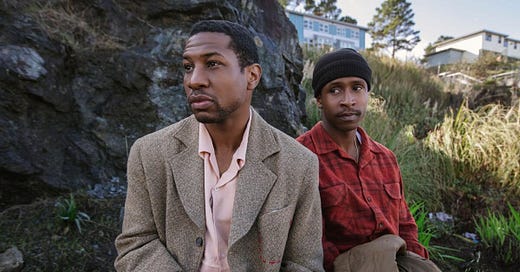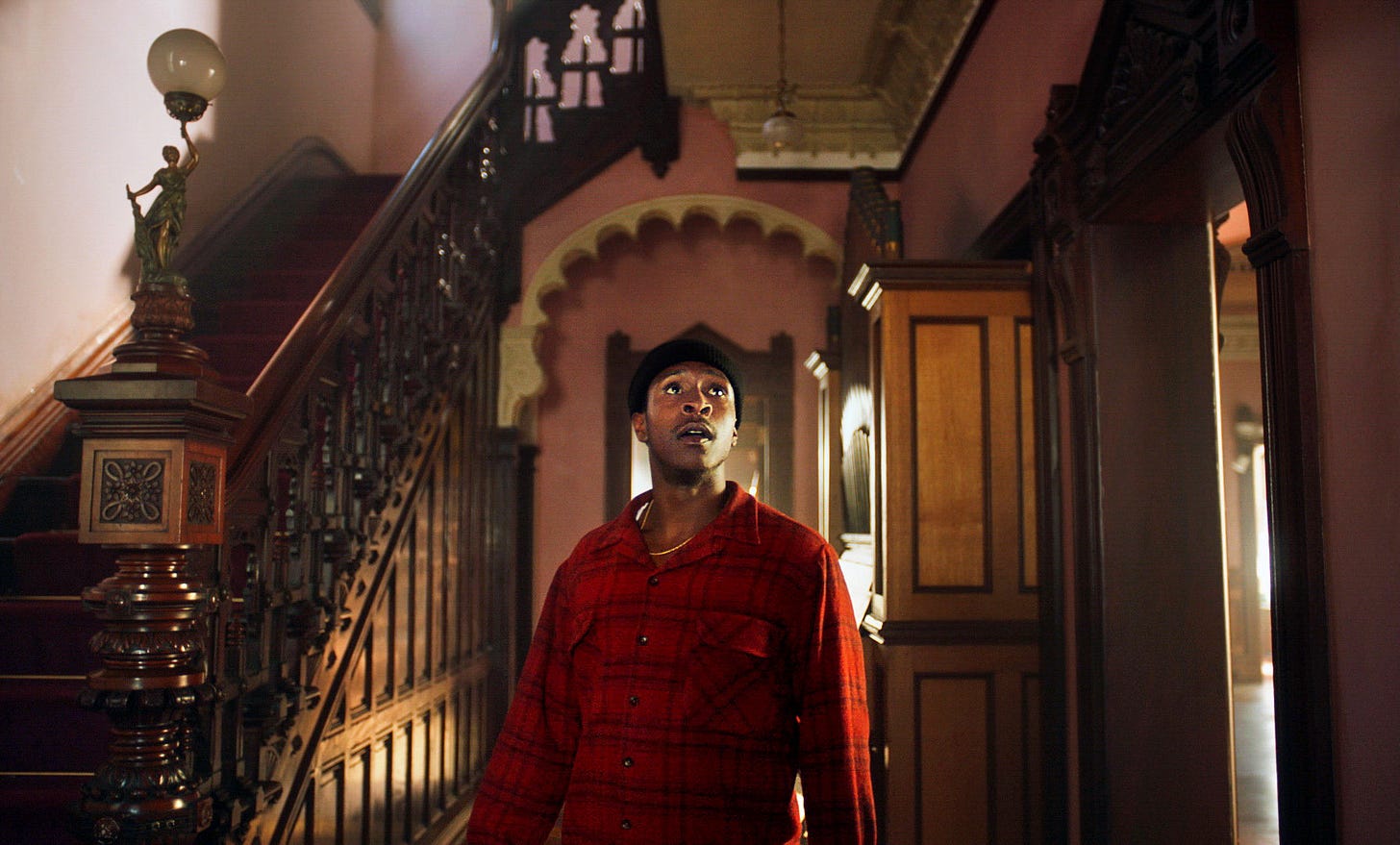The Classics (And Why They Matter)
On The Last Black Man In San Francisco, why it still hits different, and why it'll forever be relevant
To be a classic, a work of art, whether an album, film, or television show, must leave a lasting impression on those who experience it. It must be transcendent and contemplative, entertaining, and thought-provoking.
After a holiday season in which I watched more films and TV shows in two weeks than I ever have, I’m reminded of the power of storytelling, the importance of cultivating that skill, and the calling on my life to prioritize creating stories. So, that’s what we’re here to do.
I struggle to write about this film and share my ongoing reflections with it because I feel unable to do it justice. It is deeply a part of me in ways that are hard to convey.
Part of that may be a lack of film lingo and knowledge, but the other part is sheer defense and insecurity. An attempt to share what this film means to me and why it lives in my canon opens me up to scrutiny and disdain. You don’t have to like it as much as I do, but if you’ve seen it and disliked it, oh my, my knee-jerk reaction is to have nothing to do with you.
What a phenomenal piece of art.
Friendship is one of those things we so often underrate but find incredibly difficult to hold on to. When you combine the responsibilities of life, like jobs, families, and mortgages, finding the time and energy to cultivate relationships can be an insurmountable challenge. For Black people, that can be improbable. For Black men, it is often impossible.
At twelve years old, I was told I was the “man of the house,” which is truly an asinine thing to say. At the time, I embraced it, partly because I didn’t know any better. To say I was still a boy would be a massive understatement. With all the hindsight of a quarter century of life, I’m comfortable saying I was still a baby, unaware of the world and all it had to offer and take away.
When you’re plunked into those unlucky situations, the ones that strip you not only of innocence but of your childhood in its entirety, seminal moments of community become paramount. Unfortunately, those are often few and far between, too.
Friendship, fantasy, and responsibility are the defining themes of the brilliant and breakthrough film The Last Black Man in San Francisco. The film, which stars Jimmie Fails as himself, follows Fails and his best friend, Mont (Jonathon Majors), as they explore a city they love but increasingly do not recognize.
Jimmie and Mont wait for the bus daily, skateboard around town, and slug their way to working-class jobs. In between, Jimmie obsesses over his childhood house, unable to come to grips with the White couple currently occupying it, their unwillingness to upkeep the home, and his inability ever to have the means to afford it. After all, Jimmie’s grandfather built the house himself in the 1940s with his bare hands.
There’s the obvious sentiment of gentrification, which has seemingly been made the new colonialism. Jimmie lived in that house as a child until he didn’t, and now he doesn’t recognize what has become of this nearly White and Asians-only neighborhood in a city known for way more than tech and vegan restaurants.
[continued below “The Scenes We Can’t Unsee”]
The Scenes We Can’t Unsee
The Opener (Stunning!)
Ripe with stunning visuals, a superb original score, and a poetic voice-over, you are immediately dropped into the world of Jimmie and Mont, enthralled by everything that surrounds it. If five minutes of a film could be nominated for an Academy Award, this would undoubtedly be it.
Dealing With Grief as a Black Man
Where’s the focus? What kind of questions do you find yourself asking? What emotions arise within you? Grief is complicated. Grief as a Black man is taboo. Though we don’t have the luxury of fearing death, we are constantly faced with the question – be vulnerable and work through my emotions, prayerfully coming out on the other side a better person with people still in my corner who didn’t run as soon as they saw me display an ounce of vulnerability? Or continue to live up to the standards and expectations of society, because, at the end of the day, I know that’s what most people are sticking around for anyway? And when I can’t hold it all together, who’s there to wipe my tears?
You don’t get to hate it unless you love it
Self-explanatory.
I Create My Own World, Out of Sheer Necessity
Sometimes, to survive what has happened to you, living in your own alternative world is a requirement. Believing a fantasy is the only thing that helps you crawl your way through and out of crisis, and no matter how confronted with reality you may be, the desire to stand firm on your myth is morphed into necessity. Cold world we live in, but sometimes, to make it home to my baby, I gotta imagine something is there that isn’t. And trust and believe – I’m a make home to my baby.1
Now I Understand Why Everybody Leaves
When we decide to no longer put on a show for others, we recognize the true value of ourselves and the infinite freedom found in elevating authenticity and autonomy over acting. The harsh reality is the volume of individuals who will no longer want to be a part of your life when you stop being who they want you to be. Perhaps that is why everyone leaves – lovers, friends, family2 – and the prolonged trials of life stick around. Even so, finding the inner strength to BE YOU, no matter what you “lose” in the process, is about as close to self-actualization as one can ever be.
In many ways, The Last Black Man In San Francisco is an ode to Black culture and experience.
Too often, Black people are sidelined in the stills of history. As many American cities re-write their past and future simultaneously, you rarely hear of Black folks’ contributions to the urban landscape anywhere west of the Mississippi, sans Los Angeles. Yet before the geeks with sticks up their asses and rimless glasses landed in the Bay Area or Seattle or Austin, Black people were ever present, having built much of the infrastructure, labored in the cultivation of most of the ideas, and raised many of the people sitting and standing in offices today. We are more than the American South or Midwest, but popular culture rarely recognizes such.
It bears to be said, then, that perhaps the reason many Black men struggle to maintain friendships is not a lack of effort but rather a product of evolution. Displacement has been the norm for centuries of Black American families, and though how we are removed from our dwellings has changed over time, the underlying sentiment hasn’t. You don’t belong here, they say, even when we know we do. Maybe that constant rejection and continuous fear of removal lends itself to Jimmie’s sudden and abrupt separation from those he truly loves.
Any attempt to highlight one moment of my life and connect it to this film would be futile. To do so would limit the impact. Part of why it’s so seminal is it being the lone film that speaks to the totality of my experience as a Black man. Put another way – there are high highs and low lows, a search for belonging, the moment you’re forced to confront the cold reality that you don’t belong anywhere, and the truth that no matter what life throws at you, you have to pick yourself up from the pavement and keep pushing forward.
Spoiler alert—the film's climax sees Mont put on a full-stage production of epic proportions. At the film's end, Mont confronts Jimmie in a theatrical and heart-wrenching way about the fantasy world he has created. Jimmie’s grandfather did not build the house he loves and adores. The task Jimmie has devoted himself to—taking possession of this home by any means necessary—is a fantastical pursuit.
I not only see myself in every frame of The Last Black Man in San Francisco, but I feel myself in every frame. Sometimes, the world hands you cards so unfairly, so unevenly distributed, with no light at the end of a proverbial tunnel that does not exist, that the only way to stay sane and make it in the world is by creating one of your own.
The Last Black Man in San Francisco isn’t perfect. There are times when the dialogue could be richer, and the film would have benefited from deeper backstories about a couple of characters that would help with development. Yet that, too, is one of the explanations for its brilliance.
Black men, myself included, rarely ever get to tell our story and seldom get to tell it in full. Despite that limitation, Jimmie’s story is entirely told in the areas that matter most.
Without question, Jimmie loves his childhood home, and he loves his friend Mont, and as the film progresses, you find yourself hoping that when the credits start to roll, he ends up with both in hand. But that wouldn’t be a realistic depiction of life for a Black man, would it?
Tryin not to get swallowed by locusts / tryna stay focused/ kinda like Moses / like somebody chose us / this weight on my shoulders / I feel these emotions / but still I keep going / a pen to a poet / I been through the motions / I’m feeling heroic
Oh my smile my mind reassure me I don’t need no one…




